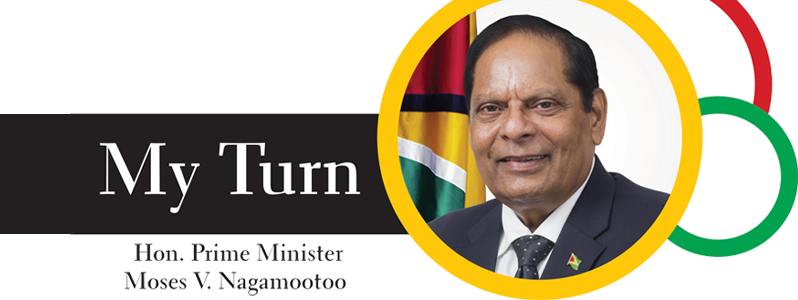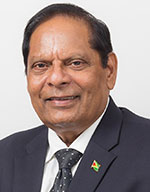IN recent weeks, my attention has been drawn to threats by the leader of the opposition (LOO) about his intention to wage new and different methods of struggles in Guyana. From his pronouncements, it appears that the opposition leader wants to trade his diaper for guerrilla fatigues.
I have been in politics long enough to experience both the waves of revolutionary fervour and the ebbing tides of setbacks; and though those threats were intended to draw attention to him, I feel inclined to point out to the LOO that there are ugly pitfalls, including the social costs in an ethnically divided country, that could follow his wild talk.
BAD HOMBRES
With the advent of the 1960s, a new term was used to describe corrupt and autocratic leaders in our Region. They were referred to as “Gorillas”. Those were really “bad hombres”, as President Trump might have called them. In several countries in Latin America, bands of patriotic fighters had resorted to armed struggles against the Gorillas. Those fighters were heroically labelled, “Guerrillas”.
Most of us in the vanguard of the youth movement were fed on admiration for the guerrillas. We read books on guerrilla warfare, the most outstanding being the title by that name which was written by Ernesto Che Guevara, just after the Cuban Revolution; and Robert Taber’s “The War of the Flea: A study of Guerrilla Warfare”.
I embraced Che, always, as my hero, and admired Camilo Torres, a Catholic priest who had become a guerrilla fighter in Colombia. I have been fortunate to meet during my travels a number of guerrilla fighters, including Madame Nguyen Thi Binh of Vietnam, Sam Nujoma of Namibia, Robert Mugabe of Zimbabwe, the now embattled Daniel Ortega of Nicaragua and Joe Slovo, chief of staff of Umkhonto we Sizwe of South Africa.
I have learned from the latter that armed struggles were not intended to defeat the apartheid regime of South Africa; it was to win a place at the negotiating table. Slovo was to emerge as the principal strategist and negotiator in talks that eventually brought Nelson Mandela to office.
REVOLUTIONARY WARFARE
The idea of revolutionary warfare has been a feature of left-wing political struggles in Guyana. And it invariably coexisted with conventional “Westminster” politics during the post-independence period.
I had lived through the difficult period of rigged elections (1968-85), during which time the PPP had opted to pursue “all forms of struggle” – parliamentary and non-parliamentary, legal and non-legal. The combination of forms of struggle had resulted, at the political level, in non-cooperation and civil disobedience, demonstrations, boycotts, picketing and other kinds of protests. At the industrial level, there were strikes and sabotage.
Those methods of struggle were interspersed with phases of political cooperation (PPP’s critical support), calls for a Government of National Reconstruction and National Unity (WPA); and National Patriotic Front/ Government (PPP). There were also limited engagements that gave way to “talks” about a coalition government, principally between the PPP and the PNC, and then to a new political culture that was based on routine and structured dialogue, consultation and inclusivity.
PRECIPICE OF CONFRONTATION
Guyana had moved away from the precipice of violent confrontation with the holding in 1992 of elections that were free and fair, free from fear, and that were transparent and credible. Since then, seldom were there calls for extra-parliamentary struggle or new forms of struggle, though there were sporadic boycotts, walkouts and disruptions of sittings in the National Assembly. The opposition routinely resorted to the courts, but never advocated extra-judicial or non-parliamentary struggles.
That was the status quo even when the post-Jagan PPP was in government, although there were plenty reasons for a switch to non-conventional politics against entrenchment of corrupt practices and the descent to one-man, authoritarian methods of rule. A death squad had been running amok and politicians were in bed with drug lords under a PPP administration that had assumed the image of a gorilla outfit.
Between 2011 and 2014, that gorilla regime was spending state revenues without the approval of parliament. It was practising blatant nepotism and cronyism. State assets such as the Sanata Textile complex were hived off to friends. So too were state lands, tax concessions, radio and television licences.
The PPP regime had stacked up a thick pile of indictments for criminal conduct, including:-
* Non-payment of public monies into the Consolidated Fund;
* Lack of transparency over the Marriott hotel project,
* Questions over sale of land to Ed Ahmad and the award of the Amaila road contract to ‘Fip’ Motilall;
* Shady NIS investment in the Berbice Bridge Company Inc.,
* Use of Geology and Mines Commission funds on interior roads with little or no accountability;
* improper use of state funds on a posh, private housing development at Sparendaam, East Coast Demerara, known as Pradoville 2, for the political elite;
* Increase in salary for the then President by 500% with a juicy pension package;
* Lavish travel and medical expenses for the political elite, including air fares and allowances, non-refundable “contingencies”, of which a whopping $140 million was expended on the President.
There have been credible reasons for resort during 2011-2015 to non-conventional methods of struggle against a regime that had lost its legitimacy. But the Alliance For Change (AFC) instead continued its call for transparency in government by demanding the establishment of a public procurement commission. The five-party opposition, A Partnership for National Unity (APNU), was calling for local government elections, last held in 1994. David Granger, a retired army leader, was hoisting not a gun, but a placard on the picket line.
BALLOTS NOT BULLETS
The Ramotar-Jagdeo minority regime eventually crumbled under the weight of its own illegitimacy on November 10, 2014, when the PPP prorogued Parliament. Having stripped itself of its protective parliamentary armour, It exposed itself as a Gorilla Regime – using extra-parliamentary methods of rule – until new elections were called on May 11, 2015. The PPP fell peacefully, silently. The ballots, not bullets, had triumphed.
So, I find rather interesting the loose talk by the opposition leader of different forms of struggle, based not on what Marxists would insist should be a concrete analysis of the concrete situation, but on the figment of a colourful imagination that the next elections would be rigged.
The LOO, though inexperienced, would know that rigged elections alone would not ipso facto create the objective conditions for the emergence of a revolutionary situation. It would require the incubation of the subjective factors, the so-called insurrectionary core, in a cradle of racist incitement to groom them for deployment as an emotional weapon in “other forms” of struggle.
GUYANA PULLED BACK
For all our history of conflicts, Guyanese can hold themselves up to the world that they have avoided open, violent confrontation. There were occasions when Guyana had pulled back from the precipice of civil war. We have built our civilisation on a promise that we could survive peacefully as a united people.
I can understand the impatience of the leader of the opposition, who would experience a dramatic mood swing by Tuesday when the Caribbean Court of Justice rules on his third presidential term bid. Despair may turn into desperation, but for other reasons, as the PPP would sooner be locked in a new cycle of internal battle over leadership between the “spent” Jaganite old guards and the opportunistic Jagdeoites.
This would happen at a time when an interesting trend is emerging from recent elections in Amerindian villages, where voters were breaking free and flying away from party alignment and entrapment. Threats about “new forms of struggle” would not stop the desertion from the opposition camp. As old people say: “only mad dogs bark at flying birds”!
June 24th, 2018



.jpg)








